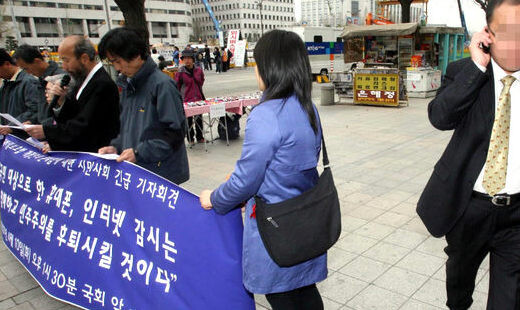hankyoreh
Links to other country sites 다른 나라 사이트 링크
Law revision will give authorities access to phone, Internet data for 1 year

A campaign against a revision of the so-called "telecommunications privacy law" has been getting fiercer. Under the proposed revision bill, it will be possible for the government to monitor mobile phone conversations, e-mail, and Internet messenger services, and telecommunications data and Internet use records will be stored by companies for at least a year.
Opponents say that to record people's private lives itself undermines human dignity, and considering the behavior of Korea's information and investigation authorities thus far, the proposed amendment will allow them to abuse their authority, they said.
At a joint press conference on April 10, civic and human rights organizations such as Lawyers for a Democratic Society and the Korean Progressive Network Center said, "The bill will lay the foundation for 'Big Brother.' "
"To store data on individuals' location, telecommunications dealings, and Internet use is almost the same as recording the private lives of the entire 40 million-some South Koreans," said Lee Eun-u, a lawyer.
The bill, which passed a subcommittee under the National Assembly's Legislation and Judiciary Committee in March but which still faces further ratification, would require mobile phone and Internet companies to install equipment to monitor mobile phones, e-mails, and messenger services on their networks. If the companies do not comply, they would face punishment.
According to the bill, information on telecommunication users' location must be included in call details kept on record, and companies must keep the data and records of Internet users for over a year. Telecommunications data includes all the information on mobile phone conversations, text messages and Internet services used and sites visited. By using the data, authorities can seek information on the exact whereabouts of elecommunications users during a year's duration.
Information and investigation authorities could request monitoring or telecommunications data from such service providers in the past. But according to the proposed revision, all companies with information needed to figure out individuals' routes of transit, such as credit card and subway and bus card companies, will be affected.
Besides the old law's stated crimes it seeks to prevent - including treason, murder, drug-related crimes, and kidnapping - trade secrets and technology leakage were added to the list of target crimes by the revision.
Related authorities such as the National Intelligence Service (NIS) and the prosecution said that in order to cope with increasingly sophisticated crimes and terrorism, it should be made possible for them to intercept mobile phone and Internet data, as well.
Please direct questions or comments to [englishhani@hani.co.kr]
Editorial・opinion
![[Column] Park Geun-hye déjà vu in Yoon Suk-yeol [Column] Park Geun-hye déjà vu in Yoon Suk-yeol](https://flexible.img.hani.co.kr/flexible/normal/500/300/imgdb/original/2024/0424/651713945113788.jpg) [Column] Park Geun-hye déjà vu in Yoon Suk-yeol
[Column] Park Geun-hye déjà vu in Yoon Suk-yeol![[Editorial] New weight of N. Korea’s nuclear threats makes dialogue all the more urgent [Editorial] New weight of N. Korea’s nuclear threats makes dialogue all the more urgent](https://flexible.img.hani.co.kr/flexible/normal/500/300/imgdb/original/2024/0424/7317139454662664.jpg) [Editorial] New weight of N. Korea’s nuclear threats makes dialogue all the more urgent
[Editorial] New weight of N. Korea’s nuclear threats makes dialogue all the more urgent- [Guest essay] The real reason Korea’s new right wants to dub Rhee a founding father
- [Column] ‘Choson’: Is it time we start referring to N. Korea in its own terms?
- [Editorial] Japan’s rewriting of history with Korea has gone too far
- [Column] The president’s questionable capacity for dialogue
- [Column] Are chaebol firms just pizza pies for families to divvy up as they please?
- [Column] Has Korea, too, crossed the Rubicon on China?
- [Correspondent’s column] In Japan’s alliance with US, echoes of its past alliances with UK
- [Editorial] Does Yoon think the Korean public is wrong?
Most viewed articles
- 1‘We must say no’: Seoul defense chief on Korean, USFK involvement in hypothetical Taiwan crisis
- 2‘Weddingflation’ breaks the bank for Korean couples-to-be
- 3[Reportage] On US campuses, student risk arrest as they call for divestment from Israel
- 4[Column] Park Geun-hye déjà vu in Yoon Suk-yeol
- 5Amnesty notes ‘erosion’ of freedom of expression in Korea in annual human rights report
- 6Korea sees more deaths than births for 52nd consecutive month in February
- 7N. Korean delegation’s trip to Iran shows how Pyongyang is leveraging ties with Moscow
- 8Will NewJeans end up collateral damage in internal feud at K-pop juggernaut Hybe?
- 9[Guest essay] The real reason Korea’s new right wants to dub Rhee a founding father
- 10N. Korean hackers breached 10 defense contractors in South for months, police say